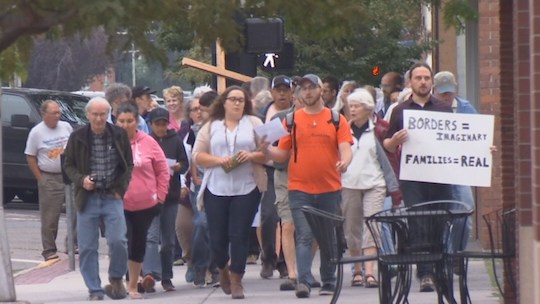In 2013, Audemio Orozco-Ramirez with the passenger in a traffic stop in Jefferson County, Montana. At that time, he had been living in the United States approximately 16 years. Orozco-Ramirez was born in Michoacan, Mexico. He has no criminal record, but the officer of the Jefferson County Sheriff’s department who stopped the car he was riding in suspected that he was in the country illegally, in part because he did not speak English. Orozco-Ramirez was arrested on a civil immigration violation and placed in a county jail sell with nine other men.
During a period of time that went missing from the jail’s otherwise continuous surveillance footage, a number of these men held down Orozco-Ramirez and raped him. In December, Jefferson County settled a federal lawsuit filed by Orozco-Ramirez for $125,000 without admitting that he was assaulted or it was liable. Since then, he has lived and worked outside Billings, checking in with Immigrations and Customs Enforcement agents on a monthly basis. During his last check-in, he was arrested and scheduled for deportation.
An appeals court judge has issued a stay against that decision pending a hearing. The feds frequently issue “U visas” to foreign nationals who are the victims of crimes and have aided authorities in their investigations, but in settling Orozco-Ramirez’s lawsuit, Jefferson County did not admit he was a victim of a crime. Legally, we can deport him. The question of whether we can do so ethically is more complicated.
Except for crossing the border illegally 20 years ago, Orozco-Ramirez has participated in the social contract. Our state and federal governments, on the other hand, have betrayed him multiple times. For example, there was the time we investigated him for civil violations as the passenger in a traffic stop. That doesn’t happen to Americans who enjoy constitutional rights. There was also the time we locked him in a cell full of rapists, also for a civil violation, and stopped watching what happened. Then there was the time we made a deal with him to forget about the rape thing and then picked him up for deportation while he was upholding his end of the bargain.
No American would agree that is the right way for a government to treat the people it governs. Yet because Orozco-Ramirez is not a citizen but merely a person who has lived here for the last 20 years, anything we do to him is fine. That’s a peculiar moral calculus, and you can read all about in this week’s column for the Missoula Independent. We’ll be back tomorrow with Friday links!



